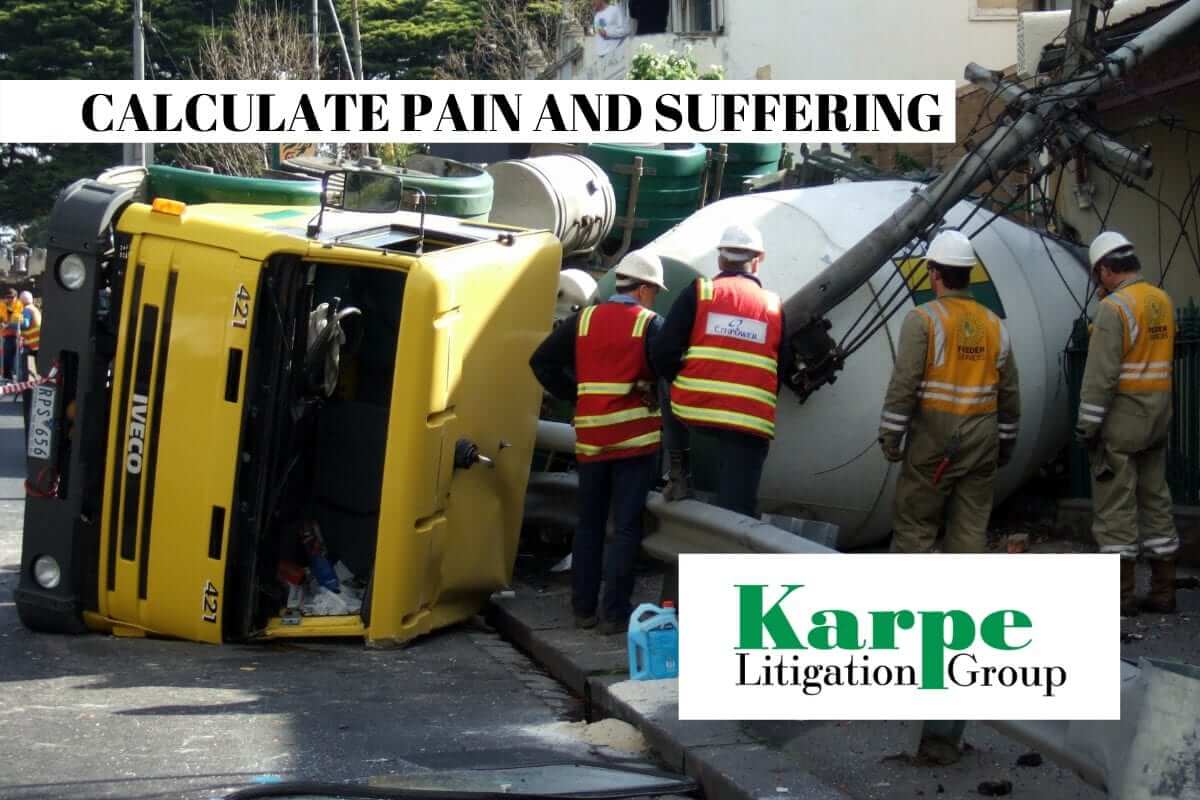
After experiencing a personal injury, you may have more than just a broken bone or a sore neck. There are a variety of mental and emotional issues such as stress, anxiety, depression, and PTSD are pervasive after such an event. While you can receive compensation for your physical ailments, you can be owed compensation for these struggles as well. As an Indiana truck accident lawyer, we work with our clients to get them the most money due after their truck accident.
What is the Calculator Method?
If your truck accident attorney is following the calculator method, they will start with your definitive damages, like physical therapy and hospital bills and whatever the money you lost by taking off work. Then, this figure is multiplied by a number between one and five based on the severity of your injury. Minor injuries are closer to zero, the catastrophic injuries are scored a five. Therefore, if you had $4,000 in medical bills and your injury was a four on the severity scale, you’d aim for $16,000 in both pain and suffering damages.
What is the Per Diem Method?
The phrase “per diem” is Latin for the phrase, “per day.” To calculate damages based on per diem method, your truck crash attorney will ask for a certain amount of money for every day you spent in recovery. In this case, if your attorney asked for $150 a day for 60 days of healing, you would be asking for $9,000 in compensation.
How Can You Prove Pain & Suffering?
Before you can fight for compensation for pain and suffering from your truck accident. It is important that you prove the existence and extent of your pain and suffering. As a general rule, the more evidence you have, the more likely it is that you’ll receive compensation. Your personal injury lawyer will gather photos of the event and your injuries, as well as medical records and opinions from mental health professionals you’ve met.
It may help to keep a personal journal outlining your feelings in the aftermath of the injury, which will also speak to your mental and emotional suffering. If you experience any forms of PTSD, depression, or insomnia, it more than helps to have a diagnosis from a professional, and any statements from your friends and family who notice any change in your behavior.
Part of the personal injury claim process is proving pain and suffering after common 18-wheeler accident causes. Proving pain and suffering in a personal injury claim can be very challenging since pain is completely subjective, and can vary drastically from person to person. Pain can be physical and/or emotional and can last a short or long period of time, depending upon the person, the severity of the injury suffered, the duration of the recovery period, any complications suffered, and the long-term prognosis.
Have You Been in a Truck Accident?
Call Us at 317-251-1840
How is Physical Pain?
Physical pain can often be described in a large number of ways up to and including: annoying or nagging to sharp, throbbing, burning, tingling, and/or stinging. Physical pain can be either constant or intermittent, and depending upon the level of pain, there can be physical pain that would cause a partial or total failure of your ability to function in your regular activities. Pain can also have both mental or emotional aspects. Physical pain can include feelings of fear, anguish, anger, withdrawal, inability to focus, and/or anxiety. Pain left untreated, can also affect your ability to function in normal daily living activities.
Pain and Suffering are Subjective
Pain and suffering are entirely subjective. The best way to rate the levels of pain is through an objective comparison of what you were able to do before versus after the injury. By creating a detailed diary outlining everything you were able to do before and after your injury, you can maintain a record of how the pain and suffering from the truck crash has affected your daily living activities and the overall quality of life.
Keep a Detailed Record
Keep a record in as great a detail as possible. Document what activities you did in your home life, work-life, and what you did for fun and relaxation before and after the injury, your emotional and mental response to these regular activities, and how you respond since the injury. Do you still engage in these activities, but now with pain, or do you avoid them completely? Is your work-life different since your injury? How is your inaction with colleagues and clients? Has the injury affected your personal relationships?
How are Physical Activities Affected?
This list is just an example of some of the activities that may be negatively impacted by an injury. For example, what types of physical activities did you participate in before the injury? As an example, did you:
- Bike
- Hike
- Fish
- Hunt
- Participate in sports for fun or on a team
- Actively volunteer
- Perform gardening and yard work
- Travel
- Attend sporting events
- Go to the movies or the theater
- Enjoy cooking at home for family and friends
How is Work-Life Affected by Injury?
How is your life at work affected by your injury after the truck accident? Are you still able to perform the same physical requirements of your job including sitting or standing for long periods of time, lifting and carrying, pushing or pulling, or working with your extremities? Since your injury did you have any new or changes in:
- Work restrictions
- Working hours
- Opportunities to earn additional money
- Job duties
- Opportunities for advancement
- Job opportunities
How Are You Affected Emotionally by Injury?
How is your emotional stability since your injury? After your truck accident injury does the following occur:
- Do you experience fear, anxiety, depression, or suffer from other types of emotional distress?
- Do you have difficulty sleeping?
- Do you have emotional or angry outbursts?
- Do you now take medication to help with emotional pain?
- Do you avoid activities that you used to love?
- Do you feel disconnected from family and friends?
When you meet with your doctor, it is important that they outline in detail your medical records their medical opinion on whether you will have a short or long-term injury, any permanent physical restrictions you must follow, and future medical care to treat your injury.
When your claim is evaluated pain and suffering from the truck accident, your pain and suffering damages claim is treated more favorably. With the more details you provide regarding how the injury negatively affects you before and after at:
- Home
- Work
- Play
- Emotionally
These details, coupled with supporting documentation from your doctor, can provide the information to support a personal injury claim including how much monetary damages are for pain and suffering from the truck accident.
When You Deal with a Truck Accident Lawyer
When you are experiencing pain and suffering from a truck accident and need to calculate pain and suffering you need to speak with an expert. Then you need to call a highly rated Indiana truck crash attorney, call Karpe Litigation Group at 317-251-1840 or contact us here today!





